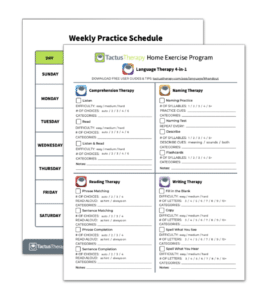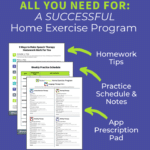Speech Therapy Homework:
Setting up a Successful Home Exercise Program Using Apps
One-on-one speech therapy sessions allow the speech-language pathologist to fully assess what’s happening and develop a treatment plan. But often these appointments are limited to under an hour and are only available a few times a week.
We know that recovery from a stroke or brain injury takes lots of repetition. That means that most of the work of getting better actually needs to happen outside the speech therapy session! Are you setting up your clients for success with an evidence-based home program?
Download your FREE homework packet to help your adult clients succeed in completing their home exercises. Easily assign a customized home exercise program (HEP) using the Tactus Therapy apps with this handy 7-page PDF.

You’ll get:
-
Tactus Therapy App Prescription Pad
{includes activities & key settings for each app} - Weekly Home Practice Schedule Template
-
Aphasia-Friendly Daily Practice Notes
{includes tools for setting goals, self-awareness, & intensity} - 9 Tips for Successful Speech Therapy Homework for Adults
In addition to receiving your free download, you will also be added to our mailing list. You can unsubscribe at any time. Please make sure you read our Privacy Policy and Terms & Conditions.
How To Use These Home Exercise Tools
Apps can be an important part of a home exercise program, and the Tactus Therapy apps are affordable, flexible, and evidence-based tools you can use to help your clients achieve the intensity they need to make faster progress toward their goals.
1. Prescribe the right apps, activities, and settings for your client’s needs.
We’ve given you one page for our best-selling Language Therapy 4-in-1 app, and another for the sequel: Advanced Language Therapy 4-in-1. You’ll find one page for all 4 of the apps in our Aphasia Elements app bundle, and another for the client-facing Clinical Tools bundle apps.
2. Set up a personalized weekly practice schedule to keep your clients on track and working daily.
Research suggests that daily practice is best, and a study of our Language Therapy app showed 20 minutes a day was enough to make significant progress.
3. Set goals before practice and make notes after practice with our Daily Practice Notes.
We know that setting goals is good practice, for both the time spent working on a home exercise program and things to achieve. This sheet helps clients set time goals, progress goals, and predict the challenge they’re about to face.
4. Get set up for success with the right time, space, and mindset for homework.
Most adults haven’t done homework in decades, so use these 9 tips to help your clients think about what goes into home practice and to get the most out of it.
PRICE LIST: Would you like a single-page list of all our apps with prices in your currency? Download our app brochure to give to your patients or place in discharge packages filled with resources!
